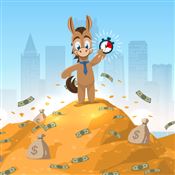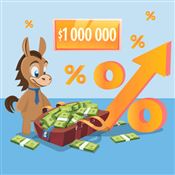What Do Most Millionaires Do for a Living
It's a question everyone has wondered about at one time or another. What do most millionaires do for a living? Read on to find out.
 |
The total number of millionaires worldwide is about 56 million.[1]
Some were born into wealth, but some made it for themselves.
For the working millionaires, you have to wonder: what do they actually do?
In this article, get the full breakdown. And who knows - by knowing how they did it, you might be inspired to carve a new path for yourself. Read on to learn how most millionaires make a living.
How Many Millionaires are Self-Made?
First, let's look at how many millionaires are self-made vs. how many were born into wealth.
According to a study published in 2019 by Wealthx, here's the breakdown of millionaires with at least $30m in net worth:
- 67.7% are self-made
- 23.7% made their money from a combination of their own efforts and inheritance
- 8.5% inherited their wealth entirely
That means that roughly 91% of millionaires, at least those with over $30 million, achieved their wealth to some degree on their own merits. Which is good news for the rest of us who weren't born rich.
Another survey, conducted in 2017 by Fidelity Investments, found that 88% of millionaires reported being self-made, and that only 12% had inherited more than 10% of their current net worth.
Where Are Most Millionaires From?
Being born in the right place and the right time probably won't make you a millionaire. But it may make a difference.
According to Wealthx, the top five countries for ultra-wealthy individuals are as follows (broken down by age):
| Under 50 Years Old | 50 - 70 Years Old | Over 70 Years Old |
|---|---|---|
| 1. United States | 1. United States | 1. United States |
| 2. China | 2. China | 2. Japan |
| 3. Japan | 3. Japan | 3. Germany |
| 4. Germany | 4. Germany | 4. France |
| 5. United Kingdom | 5. United Kingdom | 5. Canada |
What Do Most Millionaires Do for a Living?
A person's career isn't necessarily the main factor in making them a millionaire. According to Fidelity, the millionaires most likely to cite entrepreneurship as the source of their success were the ones who inherited their money.
Self-made millionaires, on the other hand, report investments, capital appreciation, compensation, and employer stock options or profit-sharing as the main sources of their wealth.
The path to wealth is more complicated than simply having a high-paying job. Investing, as well as wise use of their earnings, was what really pushed them ahead.
That said, Wealthx did offer some insight into what industries you'll find the most millionaires in. Here's what they found, once again broken down by age.
| Under 50 Years Old | 50 - 70 Years Old | Over 70 Years Old |
|---|---|---|
| 1. Banking and Finance | 1. Banking and Finance | 1. Banking and Finance |
| 2. Technology | 2. Consumer & Business Services | 2. Nonprofit Organizations |
| 3. Hospitality & Entertainment | 3. Real Estate | 3. Consumer & Business Services |
| 4. Consumer & Business Services | 4. Technology | 4. Real Estate |
| 5. Real Estate | 5. Manufacturing | 5. Food and Beverage |
According to this data, banking and finance professionals were far and away the most likely to become millionaires, and it doesn't seem surprising.
After all, not only do jobs in that industry tend to pay well, but people who do them will naturally have an advantage in terms of knowledge and understanding. Spending your days working with money will undoubtedly make you better at managing your own.
The Four Ways Millionaires Made Their Money
Tim Corley, author of "Rich Habits: The Daily Success Habits of Wealthy Individuals," spent time investigating the ways multi-millionaires made their money. He concluded that they generally followed one of four paths, which he termed:
- The Saver-Investors Path - 22%
- The Dreamers Path - 28%
- The Company Climbers Path - 31%
- The Virtuosos Path - 19%
You can take a look at his work for deeper insight, but here's a brief breakdown of how these different life strategies look.
The Saver-Investors Path is, according to Corley, the easiest way to build wealth, especially if you start young. This group came from the middle-class, and some had six-figure incomes.
They were not heavy spenders, as the name suggests, and saved at least 20% of their income. And last, they started investing early, and continued to do so throughout their lives.
Members of this group tended to earn their first million sometime in their mid to late thirties.
The Dreamers Path is apparently one of the hardest paths to wealth.
Dreamers, as Corley defined them, work in pursuit of a dream, rather than wealth itself. They may dream of becoming a successful author, actor, business owner, or musician.
This path involves working long hours and years without success—even in poverty—before it pays off in the end. And there's no guaranteeing that it will.
The Company Climbers Path produced the highest percentage of wealthy individuals. Though this lifestyle is looking less and less familiar to Millennials and members of Gen Z, it represents what was once a common way of life in the U.S.
That is, starting your career at one company and staying there your whole life, working your way from the bottom to the top. To give some perspective, it took an average of 22 years to achieve the status of multi-millionaire following this path.
Finally, the Virtuosos Path is where you'll find the doctors, lawyers, and others at the top of their fields.
Members of this group aren't necessarily characterized by innate ability, but by hard work and dedication, taking years to become the best at what they do. Their compensation reflects their outstanding ability.
What Traits Do Millionaires Have in Common?
There's clearly a range of paths to becoming a millionaire, and as individuals, they're a diverse group. But you may be wondering if millionaires have anything in common, and it turns out there are a number of things they do.
- They're ambitious. This may seem obvious, but millionaires tend to be driven to succeed. And they don't just think about their goals, they act on them.
- They have help. The truth is, most millionaires had mentors, or access to other smart, wealthy people. Most successful people tend to be the ones who are good at getting help from others.
- They fail. Not being afraid of failure helped them learn and grow as individuals, teaching valuable lessons that they could apply toward future endeavors.
Of course, risks should be taken carefully, mindful of the potential negative outcomes.
- They value time. Wasted time is something you can never get back. Knowing how to manage and protect their time is something that many millionaires have in common.
Having these traits certainly won't guarantee you success. But it will put you among the sort of people who tend to achieve it.
Bottom Line
Millionaires come from all walks of life, and surprising though it may be, the majority of them started out as average people—albeit ones from a few select countries in a few select industries.
There is no one path to becoming a millionaire, though it's clear that focusing on money will help you do it. Whether that aligns with your expectations out of life is another question.
If you can manage it, the easiest, surest path to becoming a millionaire appears to be through frugal living and careful investment over a lifetime.
Whether that works out for you or not, only time will tell. But it does provide valuable insight on how to best ensure a healthy financial life regardless.
References
- ^ "Global Wealth Report": Credit Suisse, 2021.
Jeremy Harshman is a creative assistant at CreditDonkey, a personal finance comparison and reviews website. Write to Jeremy Harshman at jeremy.harshman@creditdonkey.com. Follow us on Twitter and Facebook for our latest posts.
|
|
| ||||||
|
|
|












